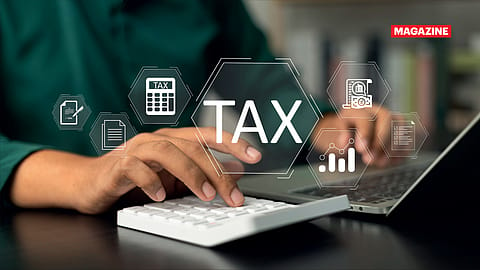Cracks in the tax code: How the new income tax bill could double-tax businesses and squeeze family offices
The new Income tax bill risks reintroducing double taxation on firms and burdening family offices

This story belongs to the Fortune India Magazine July 2025 issue.
Simplify the tax system and cut through the jargon—these were the objectives when finance minister Nirmala Sitharaman tabled the Income-tax Bill, 2025 in the Lok Sabha on February 13. Yet, two changes to key provisions—taxation on income of companies, vis-a-vis inter-corporate dividend income, and application of alternative minimum taxation (AMT)—have left the industry worried.
For example, under Section 115BAA of the existing law, domestic companies opting for the concessional tax regime of 15% or 22% cannot claim any income-linked deduction, barring a few exceptions such as deduction on employee cost, and inter-corporate dividend (Section 80M), on fulfilling certain conditions. Section 80M was introduced to avoid double taxation on dividends. However, while Clause 200 of the new Bill extends the same benefits to firms under the 15% regime, it has left out those under the 22% regime. This means these companies would not be able to claim a deduction on inter-corporate dividends.
“If a company’s profit is ₹100, and it includes a ₹20 dividend from another firm, and the company itself declares a further dividend of say ₹20, then it would have got Section 80M deduction,” explains Punit Shah, partner, Dhruva Advisors. The taxable profit in this case would have been only ₹80. “₹20 is the dividend income, and it also further declared dividend. So, only ₹80 would be taxable at the rate of 22% (under the existing law),” he says. Section 80M was introduced in the existing law to avoid double taxation on dividends.
However, that may not be the case in the new Bill, which seeks to replace the Income-tax Act, 1961. “Now, they seem to have missed to add Section 80M equivalent in the new Bill. So, it appears that ₹100, which includes the dividend income from the other firm, will also be taxed at 22%,” Shah adds.
In its recommendations to the government, Dhruva Advisors has said that this seemed to be an unintended drafting error as there is no rationale to deny the deduction of inter-corporate dividend to companies under the 22% regime. It would hurt the corporate structures, Shah says.
Next is AMT, charged at 18.5%. “Currently, this applies to firms claiming tax holiday deductions. For example, a partnership firm, setting up a plant in Sikkim, Guwahati, etc., may pay AMT on book profits, claiming the profits are tax exempt,” Shah explains.
AMT, introduced to prevent misuse of tax exemptions and deductions, ensures that entities benefiting from substantial tax incentives contribute a minimum amount to the government.
More Stories from this Issue
The new Bill, however, does not prescribe any qualifying conditions for being governed by the AMT provisions. “So far, only if you claim a deduction, AMT would have been triggered. This has been removed (in the Bill). It means every partnership firm or LLP will pay tax on book profits, irrespective of whether there is a tax holiday they are availing or not,” Shah adds. The move may hurt family offices that serve ultra high-net-worth individuals.
Tax practitioners have highlighted other issues as well, like filing of returns within the due date to be eligible for a refund. In the existing law, filing of returns within the due date is not mandatory to be eligible to claim a refund. In the proposed Bill, a person who intends to make a claim of refund must file returns within a “due date”.
The move is akin to unjust enrichment of the exchequer and will lead to litigations, warns the tax fraternity. Stakeholders have raised most of these issues in the deliberations with the select committee, comprising 31 MPs. With the Bill set to be enforced in April 2026, the months ahead will be crucial.